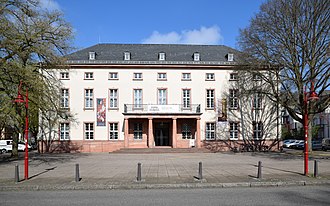
Naturalization records in Germany can be rich sources of genealogical information. They document the process by which an individual obtained citizenship in Germany or in its predecessor states and territories. These records can include details like original nationality, place of birth, residence, and sometimes family details.
The history of German citizenship and naturalization is complex. The modern nation-state of Germany was founded in 1871. Prior to that, there was no single German citizenship – instead, citizens abided by the laws of the kingdom, duchy, city, or state where they resided.
It is important to determine as much information as you can about where your ancestor or an individual of interest lived and the historical boundaries of that place to seek naturalization or citizenship records. Some of the earliest and most useful records may actually be held at the town level. Citizenship books (Bürgerbücher) trace back to the Middle Ages and they can document a new citizen's name, origin, and occupation, which can be useful if your ancestor moved from elsewhere. While not identical to the naturalization process at the national level, the process of becoming a citizen of a town shared many similarities.
Research your ancestors on MyHeritage
Research your ancestors on MyHeritage
Historical context for naturalization and citizenshipHistorical context for naturalization and citizenship

Before Germany was formed in 1871, the region now known as Germany was made up of numerous independent entities, including kingdoms, duchies, and free cities. Each maintained its own laws and criteria for becoming a citizen. Typically becoming a citizen (Bürger) involved specific requirements like owning property, paying taxes, or membership in a local guild. When someone moved to a new place, they had to apply for the right to citizenship in that town. Upon approval, their name were recorded in the town's citizenship registers, the Bürgerbücher.
In 18th-century Prussia, a former state of Germany, the process of naturalization was influenced by earlier concepts of local citizenship. For example, a merchant from France settling in Prussia in the 1700s would typically petition the king or local authorities to obtain naturalization. These petitions and the corresponding grants of citizenship were often documented and are now preserved in state or municipal archives.
How to find naturalization records in GermanyHow to find naturalization records in Germany

German state archives are a valuable starting point for researching naturalization and citizenship records. Since the appropriate archive may depend on region and historical period, it's critical to identify the exact location of your ancestor's residence and understand the historical context of that area. The Meyers Gazetteer is an essential resource to determine administrative hierarchy of towns and villages in Germany.
Once you have pinpointed the region of interest, consider consulting the following resources:
- Federal Archives of Germany (Bundesarchiv): There are a total of 23 Federal Archives scattered throughout Germany and naturalization records are among their holdings. Visit this website to learn more about them and identify an archive of interest. If you are unable to visit the archives, you may submit a search request to them.
- State Archives: Each German federal state has its own archive for that region. Examples include the Staatsarchiv Ludwigsburg for northern Württemberg area, the Staatsarchiv Hamburg for the city-state of Hamburg, and Staatsarchiv Bremen for the state of Bremen. Remember to focus on where your ancestor lived to identify the state archive.
- The Prussian Secret State Archives: For the former territory of Prussia, which no longer exists, this archives in Berlin houses extensive collections of administrative records like naturalizations and citizenship books.
- Municipal and Town Archives: Local archives often preserve citizenship books (Bürgerbücher) and other records pertaining to citizenship rights. These records can date back to as early as the Middle Ages.
Learn more about Archives in Germany to identify the best ones to support your research efforts.
Naturalization in Germany in modern timesNaturalization in Germany in modern times

Germany has had a surge of naturalizations recently. More than 200,000 people obtained German citizenship in 2023, the highest total since the year 2000.[1] The country has relaxed its laws to make a path to citizenship more viable.[2]
Requirements for Germany citizenship include the following:[3]
- You have lived habitually and legally in Germany for 5 years
- You can prove your identity and current citizenship
- You have a permanent right of resident or long-term residence permit
- You can financially support yourself and dependent family members
- You have sufficient knowledge of German, at least level B1
Additional conditions and the process to naturalize can be found here.
For researchers seeking recent naturalization records in Germany, it may be difficult due to privacy laws. The Federal Archives Act (Bundessarchivgesetz) protects personal records pertaining to anyone born less than 100 years ago. A special request may be made for immediate family members who can demonstrate a legitimate interest.
See alsoSee also
Explore more about naturalization recordsExplore more about naturalization records
- Paths to Naturalisation by Germany's Federal Government Commissioner for Migration, Refugees and Integration
- The Evolution of German Citizenship Law by American-German Institute
- Finding Answers in Naturalization Records by Legacy Family Tree Webinars
- Immigration and Naturalization Records for Genealogy by Family Tree Magazine
- Naturalization Records for Germans who immigrated to the United States by German Genealogy Group
References
- ↑ Germany records highest number of naturalizations since 2000. Deutsche Welle. May 28, 2024. https://www.dw.com/en/germany-records-highest-number-of-naturalizations-since-2000/a-69201183
- ↑ The Evolution of German Citizenship Law. American-German Institute. Feb. 16, 2023. https://americangerman.institute/2023/02/the-evolution-of-german-citizenship-law/
- ↑ Paths to Naturalisation. Federal Government Commissioner for Migration, Refugees and Integration (Germany).https://www.xn--einbrgerung-whb.de/

